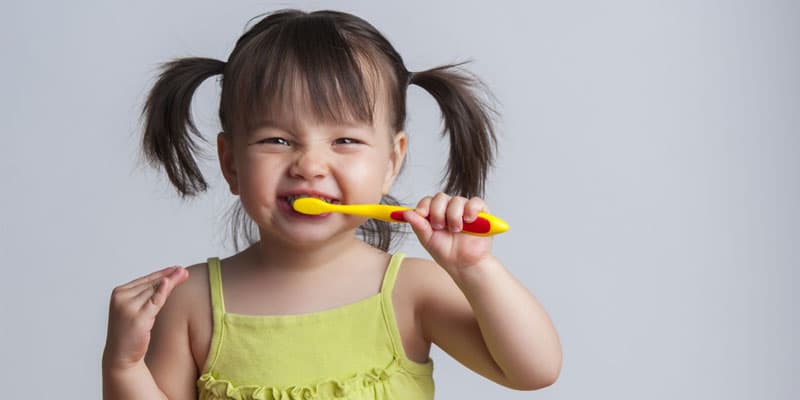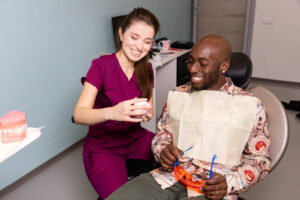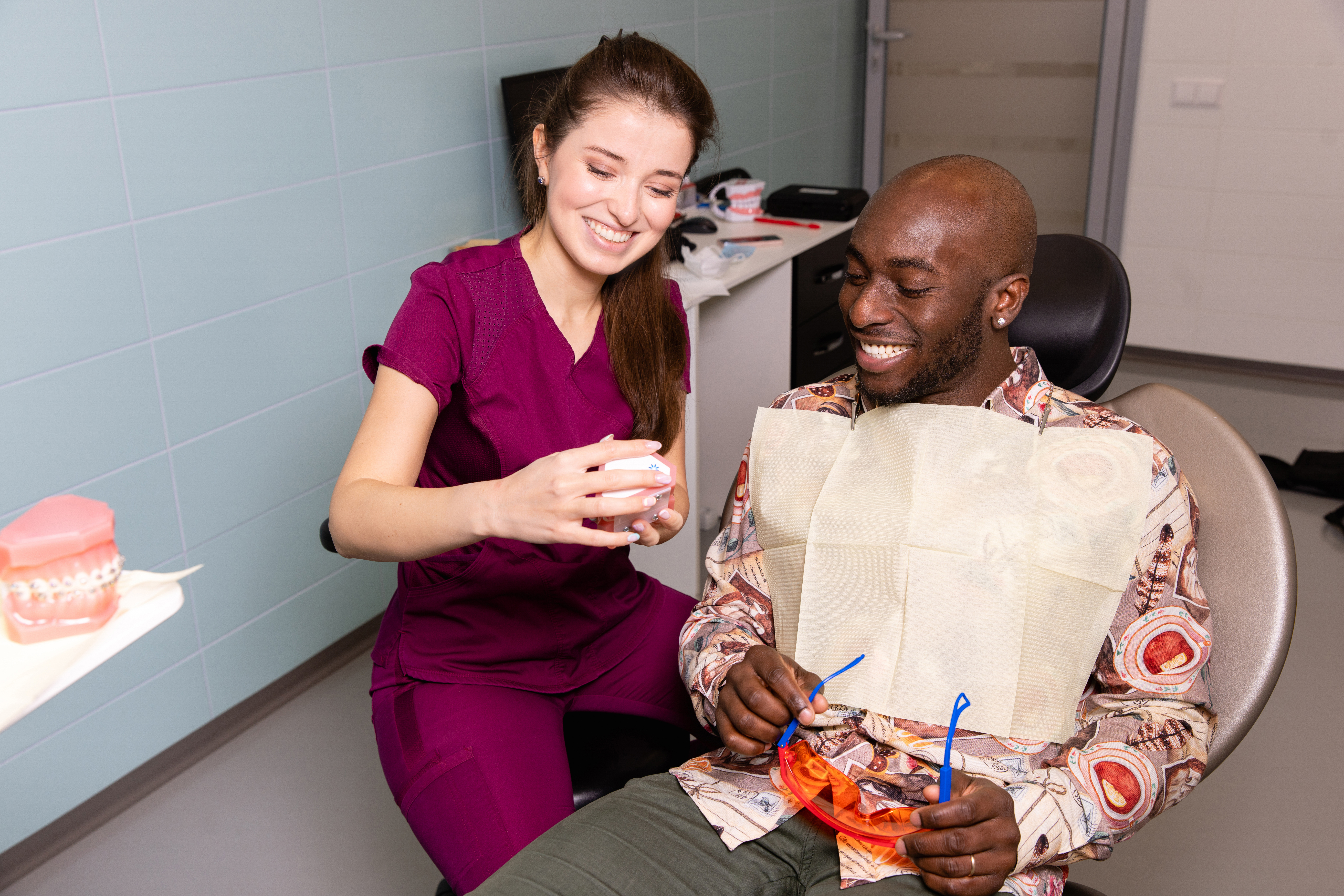- What ages do primary teeth come in?
- Caring for your baby’s teeth
- When do permanent teeth come in?
- When to make your child’s first dentist appointment
There’s nothing like a new baby to bring joy to any family, as well as the excitement of each new milestone in your child’s development.
One of those important milestones is when their teeth start to appear. This process starts in infancy and doesn’t stop until young adulthood with the arrival of their last permanent wisdom teeth.
What ages do primary teeth come in?
One of most significant – and sometimes difficult – milestones is when your baby begins teething.
As soon as 4 months old, you might start seeing a little white tooth pushing it’s way up through the bottom gum. Over the next two years, you’ll start seeing more of these primary teeth filling up your child’s mouth, all the way up until their third birthday.
Sometimes, teething can be accompanied by unpleasant side effects that can cause your baby discomfort, and disturbed sleep for you – and as we all know you’re not getting enough as it is!
Here are some of teething’s side effects, and what you can do to help your baby (and you) get through them:
- Irritability: Those first teeth, along with the final molars, are often the most painful on your baby’s tender gums. The best thing you can do to help is cuddle your child, offering warm, soothing words of reassurance and comfort.
- Skin rashes: Drooling is natural for babies as their salivary glands develop. However, teething can exacerbate drooling, and bacteria from the excess moisture can cause a skin rash around the mouth, cheeks, chin, and neck. Periodically wiping the area to keep it clean and dry, as well as applying a gentle barrier cream can help keep rashes at bay.
- Sore or tender gums: Those erupting teeth can cause your baby to have painful gums. Use a clean finger or gauze to gently rub the gums, which will create counter-pressure to help alleviate their discomfort.
- Excess biting and gnawing: Is your baby suddenly biting down on everything it can get their hands on? This is a side effect of sore gums, and your baby is looking for something to help reduce the pain. You can help by giving your baby something cold to chew on, be it a cool teething ring, chewing beads, or toys that they can grab and use when needed (be aware of objects that could be choking hazards).
- Increase in temperature: Teething can also make your baby feel warmer than usual, which isn’t usually a cause for concern. However, if your baby’s temperature reaches 100.4° F (38° C), you should check in with your doctor.
These are the type of teeth that will erupt in your child’s mouth:
- Incisors: These teeth have a thin cutting edge that act like scissors cutting through food when the jaws come together
- Canines: Canines are the pointy teeth located on both sides of the incisors, and are used to tear food
- Molars: These large teeth are located at the back of the mouth, and have broad, flat surfaces that grind food before swallowing
Baby teeth development chart
The time when these teeth erupt varies from child to child, but most children generally follow this timeline:
| Tooth | When It Emerges |
| Central incisor (Lower) | 6 to 10 months |
| Central incisor (Upper) | 8 to 12 months |
| Lateral incisor (Upper) | 9 to 13 months |
| Lateral incisor (Lower) | 10 to 16 months |
| First molar (Upper) | 13 to 19 months |
| First molar (Lower) | 14 to 18 months |
| Canine (cuspid) (Upper) | 16 to 22 months |
| Canine (cuspid) (Lower) | 17 to 23 months |
| Second molar (Lower) | 23 to 31 months |
| Second molar (Upper) | 25 to 33 months |
Caring for your baby’s teeth
Baby teeth are important. They help your child chew properly and speak clearly, and act as placeholders for their permanent teeth. They also help your child develop good oral hygiene habits they can use throughout their lives.
That’s why it’s important to keep your child’s baby teeth clean and healthy. By using the following tips, they’ll stay that way:
- Start cleaning the gums early: Even before the teeth start coming in, you can help protect your baby’s oral health by removing bacteria that can stick to the gums. Gently wipe the gums at least twice per day with a clean finger or soft cloth, especially after mealtimes and just before bed.
- Brushing your child’s teeth: Using a baby toothbrush and a little toothpaste about the size of a grain of rice, gently brush the front and back of your baby’s teeth.
- Teach your child to brush: Once your child can hold and use the toothbrush on their own, they should start brushing their own teeth. Be sure to supervise until they’re old enough to rinse and spit independently.
Also, keep an eye out for signs of tooth decay, such as pits or brown or white spots on the teeth. If you see any, make an appointment with your family dentist for inspection and treatment.
When do permanent teeth come in?
At about the age of six, primary teeth begin to become wobbly, and over the next few years will begin to fall out. Although some children may be unsettled by losing a tooth, this can also be an exciting time as kids begin to feel “grown up”, and start getting visits from the Tooth Fairy!
This now leaves room for the permanent teeth to erupt. As with primary teeth, adult teeth development vary from child to child, but the timeline generally looks like this:
| Tooth | When it Emerges |
| First molars | Between 6 and 7 years |
| Central incisors | Between 6 and 8 years |
| Lateral incisors | Between 7 and 8 years |
| Canine teeth | Between 9 and 13 years |
| Second molars | Between 11 and 13 years |
| Third molars (wisdom teeth) | Between 17 and 21 years, if at all |
What age should my child start going to the dentist?
You can start bringing your child to the dentist at any point, but generally we recommend coming to see us when your child is between 2 and 2.5 years old. At this age, your child can independently hold their mouth open and answer questions about their oral health. It’s also a great age to begin forming a relationship with your dentist, and developing a positive attitude towards dental visits in the future.
Primary and Permanent Tooth Care at Yonge and Eglinton in Toronto
Your child’s teeth are important to care for at any age, so be sure to make regular dental visits a habit to protect their oral health. You’ll be starting them off on a lifetime of beautiful smiles.
If you have any concerns about your child’s teeth or overall oral health, give Yonge Eglinton Dental a call today at 416-932-2222 or visit us online to book an appointment. We’d love to see you!








